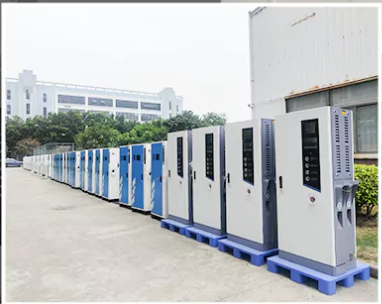
Products
Fast, Reliable, Everywhere

Solutions
Efficient, Innovative EV Charging Solutions.
News
We are committed to the innovation and application of EV charging.
Electric vehicle charging stations are anticipated to have a very bright future. Electric vehicles are getting increasingly popular, and charging stations are becoming more accessible as the globe continues to move towards sustainable energy. The followings are some developments and trends for electric vehicle charging stations in the future:
As more people switch to electric vehicles, there is a rising need for charging stations. As a result, we may anticipate seeing more charging stations erected in public locations like malls, parking lots, and airports. For owners of electric vehicles, emerging technologies like rapid and wireless charging will make charging even more practical.
Currently, most electric car charging stations are located in urban regions. Yet, as more people switch to electric cars, the charging station network is anticipated to reach more remote regions and roads. Owners of electric vehicles will find it simpler to go great distances without worrying about running out of electricity as a result.
As the number of electric vehicles on the road rises, controlling power consumption will become more crucial. By charging vehicles during off-peak hours and altering the charging rate based on power availability, smart charging systems will assist in balancing the strain on the electrical grid.

Consider the following advice while looking for electric car charging stations:
Search for charging outlets along your usual driving routes that are easily accessible. If you're in a hurry, you want to avoid driving out of your way to charge your automobile.
Take into account the station's charging rate. While some charging stations provide rapid charging, which may quickly recharge your car, some stations have slower charging rates, which may take longer to refuel your car.
Check the charging station's compatibility with your electric vehicle before using it. Be cautious to verify before you travel because certain charging stations may only be compatible with a specific class of electric vehicles.
Verify the charging station's price before using it. While some stations could be free, others might have a cost. All fees should be considered in your total cost of ownership. Be aware of them.
Check to determine if the charging station will be functional when needed. Plan and ensure you have enough time to charge your car because some stations could be crowded at particular times of the day.
Now that the infrastructure for electric cars is in place, the industry anticipates offering e-mobility solutions that are not just restricted to automobiles and creating capabilities to energize our roadways, industrial fleets, companies, communities, and utilities. PIWIN can assist customers with hardware design, firmware development, software, connection, and testing for both basic and advanced electric car charging stations as a full-service partner in developing next-generation electric car stations.
